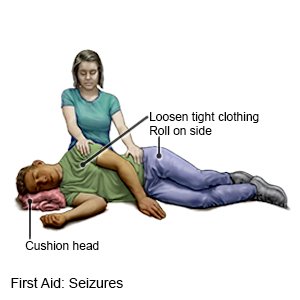Generalized Tonic Clonic Seizures
Medically reviewed by Drugs.com. Last updated on Apr 6, 2025.
AMBULATORY CARE:
A generalized tonic-clonic seizure
may also be called a grand mal seizure. A seizure means an abnormal area in your brain sometimes sends bursts of electrical activity. A generalized seizure affects both sides of your brain. Tonic and clonic are phases that happen during the seizure. The tonic phase causes your muscles to become stiff. You lose consciousness and may fall down. The clonic phase causes convulsions (repeated muscle contractions). A seizure may last from a few seconds up to 3 minutes. It is an emergency if it lasts longer than 5 minutes.
Common signs and symptoms of a tonic-clonic seizure:
- Sudden loss of consciousness
- Convulsions
- Crying out
- Not responding when spoken to
- Biting your lips or cheeks
- Loss of bladder control
- Confusion and lack of energy after the seizure stops
Call your local emergency number (911 in the US), or have someone else call, for any of the following:
- This is the first seizure you have ever had.
- You have trouble breathing or feeling alert after a seizure.
- The seizure lasts longer than 5 minutes.
- You had a seizure in water, such as in a swimming pool or hot tub.
- You have diabetes or are pregnant and had a seizure.
Call your doctor if:
- You have a second seizure within 24 hours of the first.
- You are injured during a seizure.
- You feel you are not able to cope with your condition.
- Your seizures start to happen more often.
- You are confused longer than usual after a seizure.
- You are planning to get pregnant or are currently pregnant.
- You have questions or concerns about your condition or care.
Treatment:
Your healthcare provider may treat any health conditions causing your seizures. The goal of treatment is to try to stop your seizures completely. You may need any of the following:
- Medicines may be given to treat certain health conditions. You may need antiepileptic medicine if your seizures are caused by epilepsy. You may need medicine daily to prevent seizures or during a seizure to stop it. Do not stop taking your medicine unless directed by your healthcare provider.
- Surgery may help reduce how often you have seizures if you have epilepsy and medicine does not help. Ask your healthcare provider for more information about surgery for epilepsy.
Treatment options
The following list of medications are related to or used in the treatment of this condition.
Drugs used to treat this and similar conditions
Keppra
Keppra is an anti-epileptic drug used to treat partial onset seizures in people with epilepsy ...
Xcopri
Xcopri (cenobamate) is an oral, once-daily, tablet that may be used to treat partial-onset seizures ...
Repatha
Repatha (evolocumab) is a PCSK9 inhibitor used to lower high cholesterol alongside dietary changes ...
Vimpat
Vimpat is used to treat partial onset seizures and primary generalized tonic-clonic seizures in ...
Dilantin
Dilantin (phenytoin) is an anti-epileptic drug used to control seizures. Includes Dilantin side ...
Trileptal
Trileptal (oxcarbazepine) is used to treat partial seizures in adults and children with epilepsy ...
Zonegran
Zonegran (zonisamide) is used to treat partial seizures in adults with epilepsy. Includes Zonegran ...
What you can do to prevent a tonic-clonic seizure:
You may not be able to prevent every seizure. The following can help you manage triggers that may make a seizure start:
- Take antiseizure medicine exactly as prescribed. This will also help prevent medicine side effects. Set an alarm to help remind you to take your medicine so you do not miss a dose. If you are female, talk to your healthcare provider about family planning while you are taking this medicine.
- Manage stress. Stress can be a trigger for epilepsy. Exercise can help you reduce stress. Talk to your provider about exercise that is safe for you. Illness can be a form of stress. Eat a variety of healthy foods and drink plenty of liquids during an illness. Talk to your provider about other ways to manage stress.
- Set a regular sleep schedule. A lack of sleep can trigger a seizure. Try to go to sleep and wake up at the same times each day. Keep your bedroom quiet and dark. Talk to your provider if you are having trouble sleeping.
- Limit or do not drink alcohol as directed. Alcohol can trigger a seizure, especially if you drink a large amount at one time. A drink of alcohol is 12 ounces of beer, 1½ ounces of liquor, or 5 ounces of wine. Your provider can help you set limits for the number of drinks you have within 24 hours and within a week. Your provider may recommend that you do not drink any alcohol. Tell your provider if you need help to quit drinking.
What you can do to manage tonic-clonic seizures:
The following can help you manage the seizures if you have more than one:
- Keep a seizure diary. This can help you find your triggers and avoid them. Possible triggers include illness, lack of sleep, hormone changes, alcohol, drugs, lights, and stress. Write down the dates of your seizures, where you were, and what you were doing. Include how you felt before and after.
- Record any auras you have before a seizure. An aura is a sign that you are about to have a seizure. Auras happen before certain types of seizures that are in only 1 part of the brain. The aura may happen seconds before a seizure, or up to an hour before. You may feel, see, hear, or smell something. Examples include part of your body becoming hot. You may see a flash of light or hear something. You may have anxiety or déjà vu. If you have an aura, include it in your seizure diary.
- Create a care plan. Tell family, friends, and coworkers about your epilepsy. Give them instructions that tell them how they can keep you safe if you have a seizure.
- Ask what safety precautions you should take. Talk with your healthcare provider about driving. You may not be able to drive until you are seizure-free for a period of time. You will need to check the law where you live. Also talk to your healthcare provider about swimming and bathing. You may drown or develop life-threatening heart or lung damage if you have a seizure in water.
- Carry medical alert identification. Wear medical alert jewelry or carry a card that says you have tonic-clonic seizures. Ask your healthcare provider where to get these items.

What you need to know about stopping your medicine:
Your healthcare provider can help you understand and make decisions about continuing or stopping antiseizure medicines. Do not stop taking the medicine until your provider says it is okay. You may need to be seizure free for 18 to 24 months before you can stop your medicine. Seizures might happen again while you stop taking the medicine, or after you stop. Rarely, these seizures no longer respond to medicines. Tests such as an EEG may be useful in helping you and your provider make medicine decisions.
How others can keep you safe during a seizure:
Give the following instructions to family, friends, and coworkers:
- Do not panic.
- Do not hold me down or put anything in my mouth.
- Gently guide me to the floor or a soft surface.
- Place me on my side to help prevent me from swallowing saliva or vomit.

- Protect me from injury. Remove sharp or hard objects from the area surrounding me, or cushion my head.
- Loosen the clothing around my head and neck.
- Time how long my seizure lasts. Call 911 if my seizure lasts longer than 5 minutes or if I have a second seizure.
- Stay with me until my seizure ends. Let me rest until I am fully awake.
- Perform CPR if I stop breathing or you cannot feel my pulse.
- Do not give me anything to eat or drink until I am fully awake.
Follow up with your doctor or neurologist as directed:
If you take antiseizure medicine, you will need blood tests to check the level in your blood. The medicine may need to be changed or adjusted. Write down your questions so you remember to ask them during your visits.
© Copyright Merative 2025 Information is for End User's use only and may not be sold, redistributed or otherwise used for commercial purposes.
The above information is an educational aid only. It is not intended as medical advice for individual conditions or treatments. Talk to your doctor, nurse or pharmacist before following any medical regimen to see if it is safe and effective for you.
Learn more about Generalized Tonic Clonic Seizures
Treatment options
Care guides
- Epilepsy
- Generalized Tonic Clonic Seizures
- Generalized Tonic Clonic Seizures in Children
- New-Onset Seizure in Adults
Medicine.com guides (external)
Further information
Always consult your healthcare provider to ensure the information displayed on this page applies to your personal circumstances.
